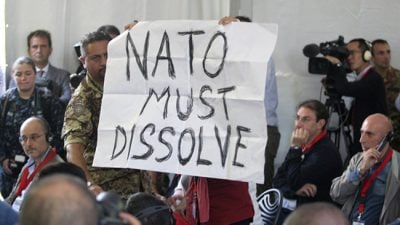
NATO Defense Ministers (Lorenzo Guerini, Pd representing Italy) gathered by videoconference on June17/18, and made a series of “decisions to strengthen the Alliance’s deterrence.” However, nobody in Italy talks about it, neither the media (including social media) nor the political world, where an absolute multipartisan silence reigns over all this. Yet these decisions, basically dictated by Washington and signed by Minister Guerini for Italy, not only trace the guidelines of our military policy, but also our foreign policy.
First of all – announces Secretary General Jens Stoltenberg – “NATO is preparing for a possible second wave of Covid-19,” against which NATO has already mobilized over half a million soldiers in Europe. Stoltenberg does not clarify how NATO can predict a possible second virus pandemic with a new lockdown.
On one point, however, he is clear: this “does not mean that other challenges disappeared.” The major problem – Defense Ministers underlined – comes from Russia’s “destabilizing and dangerous behavior,” in particular from its “irresponsible nuclear rhetoric, aimed at intimidating and threatening NATO allies.”
In this way they overturn reality, erasing the fact that it was NATO that extended its nuclear forces and bases close to Russia, especially the United States after the end of the Cold War. A strategy aimed at creating growing tensions with Russia in Europe has been methodically implemented with Washington’s direction.
Defense Ministers met in the Nuclear Planning Group, chaired by the United States, to decide on new military measures against Russia.Ukraine – That’s where NATO’s eastward expansion led
It is unknown what decisions on nuclear matters Minister Guerini signed on behalf of Italy. However, it is clear that by participating in the Group and hosting US nuclear weapons (which can also be used by our Air Force), Italy violates the Non-Proliferation Treaty and rejects the UN Treaty for the prohibition of nuclear weapons.
Stoltenberg merely said, “Today we have decided on further steps to keep NATO nuclear deterrent in Europe safe and efficient.” Among these steps there is certainly the next arrival of the new US B61-12 nuclear bombs also in Italy.
Defense Ministers spoke of another growing “challenge” which is that of China for the first time “at the top of NATO’s agenda.” China is a trading partner of many allies, but at the same time “heavily invests in new missile systems that can reach all NATO countries,” said Stoltenberg. Thus, NATO begins to present China as a military threat.
At the same time, they present Chinese investments in the countries of the Alliance as dangerous. Based on this premise, Defense Ministers updated the guidelines for “national resilience,” aimed at preventing energy, transport and telecommunications, 5G in particular, from ending up under “foreign ownership and control” (read “Chinese Ownership and Control”).
These are the decisions signed by Italy at the Defense Ministers NATO meeting. They bind our country to a strategy of growing hostility, especially towards Russia and China, exposing us to increasingly serious risks and making our arrangements on which the same economic agreements rest unstable.
It is a long-term strategy, as evidenced by the (Born) NATO 2030″ project launch made by Secretary General Stoltenberg on June 8 to “strengthen the Alliance militarily and politically” by including countries like Australia (already invited to the Defense Ministers meeting), New Zealand, Japan and other Asians, in clear anti-Chinese function.
A group of 10 advisors was formed for the Great Global (Born) NATO 2030 project, including Prof. Marta Dassù, former foreign policy adviser in the D’Alema government before and during NATO’s war on Yugoslavia, in which Italy participated in 1999 with its bases and bombers, under US command.



